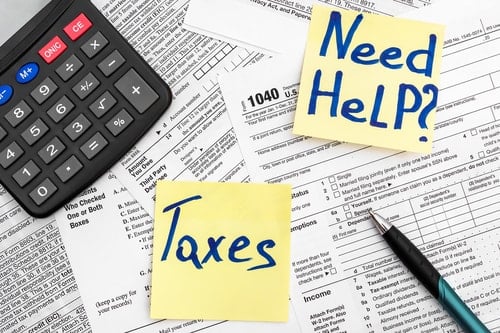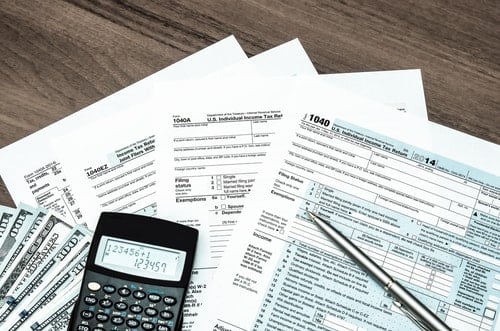
All the tasks associated with managing investment property accounting can seem overwhelming, especially if a landlord lacks the proper foundation and processes needed. Unless you employ a CPA or professional property management company, tax time could prove to be a busy and stressful time. So, continue reading below as we outline tips to prepare for year-end accounting tasks, plus ways to keep your records in check all year long.
9 Basics of Successful Investment Property Accounting
Busy landlords may find it easy to fall behind on the daily accounting tasks. However, proper record-keeping is essential to success and understanding where your business truly stands. Starting with basic accounting practices early will allow you to streamline and focus on growing your business. Let’s look at some basic processes every landlord needs, whether you have 1 or 100 properties in your portfolio.

- Avoid Comingling of Funds
- Keep Each Property Separate
- Set Up An Emergency Fund
- Choose a Tracking Method – Cash or Accrual
- Track Everything
- Implement Digital Record-Keeping
- Automate What You Can
- Stay Informed on Tax Requirements
- Hire Professionals
Avoid Comingling of Funds
To maintain proper records, separating rental property and personal funds are crucial. Open up a business checking account, dedicated savings account, and line of credit as needed. Therefore, any rental income, security deposits, and expenses will not become intertwined with a landlord’s personal finances.
Keep Each Property Separate
Just as you want to keep personal finances separate from business, each property in your portfolio should also remain separate. Besides, each property presents a unique set of expenses, profits, and losses. All of which is much easier to reconcile when it is not combined with other accounts. Therefore, with each property’s finances easily distinguished, tax time becomes much easier to handle.
Set Up An Emergency Fund
Unexpected expenses can spell disaster for landlords. Therefore, plan for these emergencies by setting up a special maintenance savings account early. So, begin the habit of funneling a small percentage of rental income into this account each month. This creates a buffer that property owners can use in times of need instead of scrambling to come up with necessary funds last minute.
Choose a Tracking Method – Cash or Accrual
The choice to use cash or accrual methods of accounting is a personal preference. That said, whichever you choose, landlords must remain consistent. Check out the differences between these methods below and decide which will work best for your business.
- Cash Method – Record both income and expenses as they come and go from the accounts.
- Accrual Method – Record both income and expenses as they happen without waiting to send or receive the cash into your account.
Track Everything
Whether you chose to create a spreadsheet to track your income and expenses or opt for a specialized property management software, tracking plays a vital role in successful accounting. Once each property has their individual accounts, landlords can begin tracking expenses and incoming funds.

Top Rental Property Accounting Software for Landlords
- Quickbooks – Quickbooks is the number one accounting software solution for any small business. They offer comprehensive tracking and reporting to help any landlord streamline their process and prepare for tax time.
- Rental Hero – Offering a user-friendly app, Rental Hero is a great choice for landlords. This software allows owners to track on a per property and per unit basis with the ability to generate separate reports for each. Additionally, Rental Hero automatically stores digital copies of receipts and links them directly to the corresponding expense.
- Fresh Books – FreshBooks boasts cloud-based software built for rental property owners. Landlords can collect online rent, send invoices, and easily track expenses. Additionally, property owners can take advantage of a free trial!
Implement Digital Record-Keeping
Gone are the days when keeping receipts in a shoebox is sufficient. Nowadays, digital receipts and invoices save time when completing accounting tasks. Additionally, records are at your fingertips anywhere and at any time. This also comes in handy if you need to transfer records easily between employees and keeps the personal information in your files more secure.
Automate What You Can
Busy landlords know that any efforts to save time on tasks are well worth it. The good news is landlords can automate everything from payments or withdrawals to task reminders. Basically, anything, even small tasks, should be automated to promote accuracy and free up a landlord’s valuable time.
Stay Informed on Tax Requirements
Landlords are not tax experts, but that does not mean they should not be well informed. So, ensure you are familiar with common tax forms and their usage related to your investment property accounting needs. Common tax forms include a W-9 or 1099 for any employees or independent contractors/vendors that earned greater than $600.00. That said, penalties for not using proper tax forms can result in large fines for landlords, so be proactive.
Hire Professionals
Landlords can choose to do everything on their own or turn to helpful software. Whether it is just a certified accounting team member or a full-service property management company, trusting the professionals is worth the added expense involved. In fact, relying on others’ expertise in these difficult areas safeguards your rental property business from added liability.
6 Investment Property Accounting Strategies for Year-end Taxes
The dreaded year-end tax time is inevitable but can easily turn into a complicated mess for landlords who are not prepared. So, how can landlords manage this time-consuming process efficiently? Check out our investment property accounting tips below to get you ready for tax time.
- Reconcile Invoices and Payments
- Prepare Your Schedule E
- Add Up Potential Tax Deductions
- Maximize Tax Savings
- Cash in on Property Depreciation
- Keep Excellent Records
Reconcile Invoices and Payments
Periodically through the year and towards the end, take time to review and reconcile invoices and payments. For any outstanding balances, send out reminders to the necessary parties and verify all payments have been received by year-end. That said, if you use online or cloud-based software, this is likely tracked for you already. So, landlords will need to follow up and send reminders.
Prepare Your Schedule E
Each year, rental property income is reported on a Schedule E (1040) IRS Form. Whether you are tracking expenses on your own or using an investment property accounting software, landlords will want to break down income and expenses into the following categories.

- Rental Income
- Refunds from Tenants
- Marketing Costs
- Commissions
- Travel Expenses
- Cleaning & Maintenance
- Repairs
- Insurance Premiums
- Legal or Other Professional Fees
- Management Fees
- Mortgage Interest
- Office Supplies
- Taxes
- Utilities
- Phone Bill
- HOA Dues
- Bank Fees
- Miscellaneous Items Not Included Above
Add Up Potential Tax Deductions
Investments and upgrades to a rental property count toward an owner’s taxes. So, keep track of any new equipment or repairs done to your investment property over the fiscal year. Some experts suggest that expenses justified as repairs are deductible and reduce your taxable income. Therefore, saving money in the long run.
Maximize Tax Savings
It is worth a landlord’s time to track the small stuff as well as the big. That said, expenses property owners incur, such as travel and insurance premiums, may not add up to huge numbers but are potential business expense deductions. Additionally, property damage could translate to a loss on your year-end taxes. So, keep track of every expense, no matter how small or insignificant it may seem.
Cash in on Property Depreciation
The IRS tax code has many specifics regarding rental property depreciation. Depreciation equals the calculated loss in value over a 27.5-year term for residential properties and a 39-year term for commercial units. Therefore, this calculation results in an expense a landlord can claim on their taxes each year. However, if you decide to sell, you could find yourself paying a hefty recapture tax. So, familiarize yourself with the process of depreciation, and when in doubt, seek the advice of a qualified tax professional.
Helpful Tip: Do you want to know how to make depreciation work for you? Check out our blog and learn how to use investment property depreciation to your advantage.
Keep Excellent Records
It is safe to say that nobody wants an audit. That said, it can happen, and the worst situation a landlord can find themselves in is unprepared. Poor or incomplete record-keeping will only attract more scrutiny from the IRS and inevitably more stress for property owners. However, with the confidence that everything is accounted for, you will be ready just n case a dreaded audit comes.
Final Thoughts
Investment property accounting is complicated and time-consuming. Even with software solutions, landlords are still required to put out significant effort, especially at tax time. What if there was an easier way? That is where a professional property management firm comes in. Our in-house accounting team at Bay Property Management Group handles everything from rent collection to 1099s and everything in between. Our convenient online owner portal allows property owners to see real-time updates on their property’s financials. Additionally, the year-end reports we provide can be taken directly to your tax professional, making year-end taxes a breeze. Give us a call to learn more about our approach to full-service rental management and how you can benefit today.
